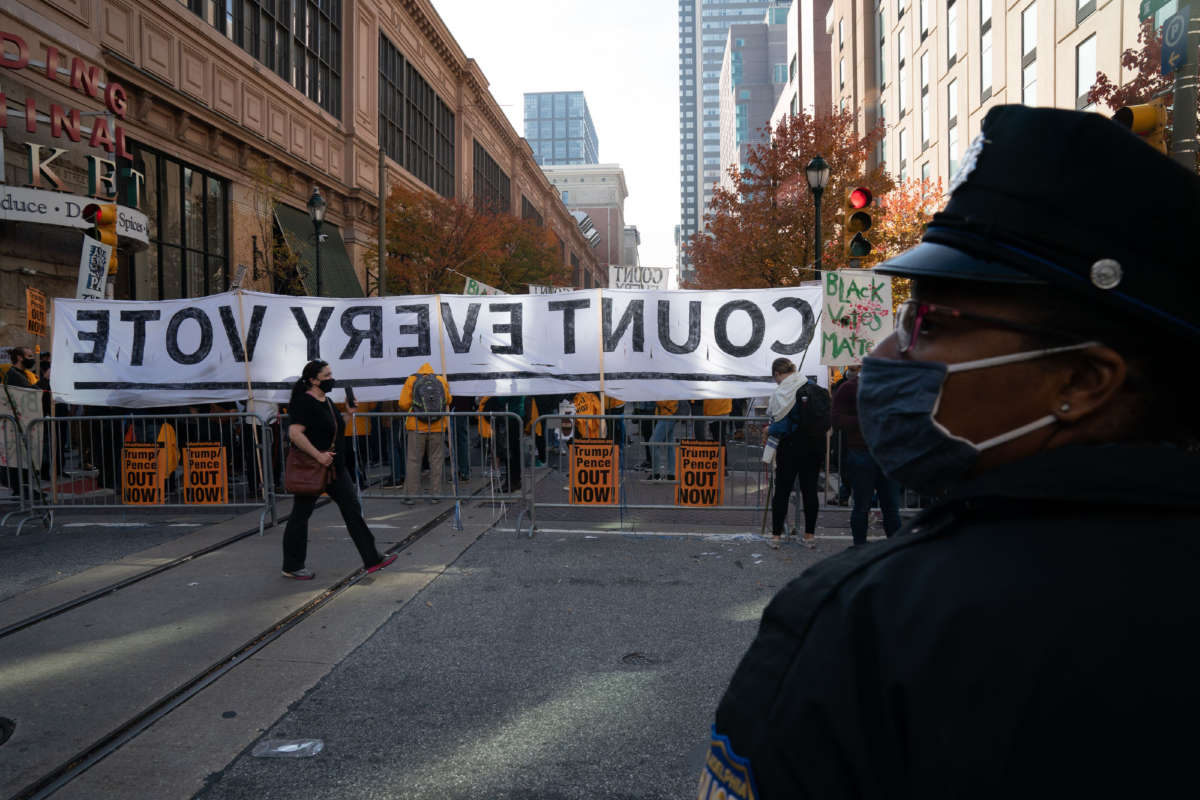Most Americans are certain they know who has won the presidential election, and nearly seven in ten are confident that votes have been counted accurately, according to a new poll.
The Navigator/Global Strategy Group poll, conducted from November 4 to 5, asked respondents who they believe had won the election between Republican President Donald Trump and Democratic candidate Joe Biden. Just 20 percent said Trump was the winner, with 52 percent saying Biden had come out victorious.
The remaining 28 percent said they were not sure, though nearly two out of every three of those respondents said they would guess Biden was the winner. When those considerations are added in, the poll found that 30 percent of Americans believe Trump won while 70 percent believed Biden was victorious.
The poll was conducted before vote count totals in Pennsylvania and Georgia flipped from Trump to Biden on Friday morning. Biden is currently leading Trump in the Electoral College, and ahead in a number of states that would secure him a win.
The poll also asked respondents to share their thoughts on the continued counting and accuracy of votes in the election. Sixty-nine percent said they were very or somewhat confident that the results would be accurate to American voters’ preferences, while 31 percent lacked such confidence.
A greater proportion of respondents favored patience during the process of tabulating votes. Just 16 percent of Americans, according to the poll, believed states that were continuing to count votes were trying to change the election’s outcome, while 76 percent said states should take the time they need in order to count every vote.
Trump’s response to the outcome of the election was also viewed negatively by most, with 57 percent in the poll disapproving of how he had reacted to the results. The question, it should be noted, was asked before Trump’s press briefing on Thursday night, in which he made many baseless and erroneous claims about the counting of ballots.
“We were winning in all the key locations by a lot, actually. And then our number started miraculously getting whittled away in secret, and they wouldn’t allow legally permissible observers,” Trump said.
The president also claimed that votes counted after Election Day were illegitimate. “If you count the legal votes, I easily win. If you count the illegal votes, they can try to steal the election from us,” he added.
Both of the president’s assertions are untrue — all votes counted after Tuesday and still at this time were cast before Election Day, and coming in as an influx of absentee ballots overwhelmingly due to voters’ concerns of the coronavirus pandemic. Additionally, observers have been allowed, from both parties, to be involved in the process of tabulating ballots.
Some Republican lawmakers in Washington have spoken out against Trump’s baseless assertions, including Sen. Pat Toomey (R-Pennsylvania). Although Toomey said he voted for Trump in the election, he derided the commander-in-chief for trying to spread misinformation about the votes that were still being counted.
“There’s simply no evidence anyone has shown me of any widespread corruption or fraud,” Toomey said in a statement, adding that Trump’s press briefing statements were “very disturbing to me because he made very, very serious allegations without any evidence to support it.”
The findings of the Navigator/Global Strategy Group poll demonstrate that a small yet sizable number of Americans will likely not accept the outcome of the election as legitimate — a problem that social media sites, including Facebook, are planning to address in the coming days.
Two anonymous sources with knowledge of Facebook’s plans spoke to The New York Times about what the site’s immediate response to disinformation would be after the election. Among the strategies Facebook will put in place include more “friction” for users planning to spread errant posts — requiring extra clicks before controversial shares can happen.
The site will also make election-related misinformation less visible on users’ news feeds, and will restrict the distribution of Facebook Live streams that relate to the outcome of the presidential race.
The moves by Facebook come in response to heightened discord fueled by disinformation on the social media site following the results of the election, the sources said. Several Facebook groups also appear to be coordinating potentially violent actions in response to lies and rumors like “Sharpiegate,” which falsely alleged votes used with Sharpie markers weren’t being counted in Arizona.
The moves by Facebook would likely be temporary, the sources added, allowing for a cooling-down period to alleviate tensions after the election.
Such action may indeed be warranted — indeed, several errant posts alleging voter suppression of Trump votes on social media earlier in the week inspired a pro-Trump group of individuals, many of whom were armed with assault rifles, to congregate outside of a vote counting center in Maricopa County, Arizona on Wednesday night, and demand to be let in to observe the process.
Join us in defending the truth before it’s too late
The future of independent journalism is uncertain, and the consequences of losing it are too grave to ignore. To ensure Truthout remains safe, strong, and free, we need to raise $43,000 in the next 6 days. Every dollar raised goes directly toward the costs of producing news you can trust.
Please give what you can — because by supporting us with a tax-deductible donation, you’re not just preserving a source of news, you’re helping to safeguard what’s left of our democracy.
